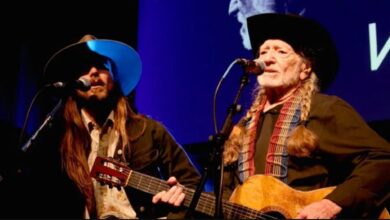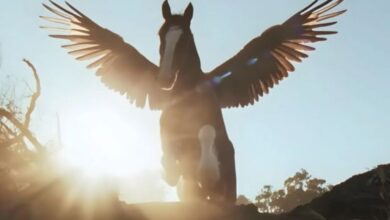Alan Jackson Moves ACM Awards Audience to Tears with Emotional “Remember When” Farewell
The 60th Academy of Country Music Awards carried the soft weight of history even before the first spotlight found its mark, but the room’s temperature changed the second Alan Jackson walked onstage. It was May 8, 2025, in Frisco, Texas, and the Ford Center at The Star suddenly felt smaller—like a front-porch gathering where one neighbor with a guitar had something important to say. When the first chords of “Remember When” rang out, you could hear a hush form—a living, breathing silence that only appears when a crowd senses it’s about to witness something that will outlast the night.
Jackson didn’t preface the song with a speech. He didn’t need to. The arrangement did the talking: gently brushed drums, a patient steel line like a memory in motion, and an acoustic figure he’s carried for decades with the same unshowy grace. The camera found his face in close-up—less a performance mask than a man taking inventory of a life—and the arena leaned forward as if to shorten the distance between the stage and the seats. “Remember When” has always been a private song sung in public; in Frisco, it felt like a public thank-you whispered to family first.
The night’s framing mattered. This was the 60th anniversary ACMs, a milestone ceremony hosted by Reba McEntire that threaded six decades of country music through a modern broadcast and a streaming audience. Lainey Wilson would sweep the major categories, legends and newcomers would share the bill, and tributes would braid memory to the moment. Against that big-canvas backdrop, Jackson’s three-and-a-half minutes functioned like the show’s conscience—simple, steady, and sure of what country music can be when it lets craft lead. The production around him receded on purpose, turning a cavernous football facility into a listening room.
What elevated the performance from lovely to landmark was context. Jackson had publicly explained in recent years that he lives with Charcot-Marie-Tooth disease, a hereditary nerve condition that affects balance and mobility. He’s talked about the challenge without self-pity, and about music as both vocation and refuge. You could see the care in his posture, the deliberateness in each step, and the unbroken line between his center of gravity and the microphone stand. When he sang “I remember when,” it carried an extra layer: a craftsman mindful of his body’s limits, still refusing to let them dictate his voice.
By all accounts—and by the roar that followed the first chorus—the audience understood that subtext. Reactions weren’t just loud; they were warm, a kind of collective exhale that sounded less like applause and more like gratitude. The ACM cameras swept past faces caught somewhere between smiles and tears, a reminder that the best country ballads don’t ask us to choose between joy and sorrow because life rarely does. “Remember When” is built for that blend: it inventories young love, hard seasons, children growing, and time’s mercies—all in language so plain a porch could hold it. In Frisco, the song returned to its natural habitat.
Technically, it was a masterclass in restraint. The front-of-house mix kept the vocal in velvet focus, letting consonants cut just enough to carry the narrative while vowels opened like windows into the hook. The steel’s countermelodies painted around the lyric instead of through it, and the low end stayed dry—a heartbeat, not a heave. On a night that also featured big-budget spectacles, Jackson proved that a well-tuned band and a story well told can hold 20,000 people still. It’s not anti-production; it’s a different kind of production—one that treats silence as an instrument with its own sustain.
Visually, the staging honored that philosophy. No fireworks, no drone ballets, no stadium-sized reveals—just a cool wash of color and a camera language that behaved like a respectful guest. The effect was paradoxical: by subtracting spectacle, the broadcast added intimacy. When the lyric reached the section about children leaving home and partners growing old together, you could feel the room’s posture shift; people weren’t watching a star, they were borrowing a memory. Country music talks often about “three chords and the truth.” Jackson reduced the night to the thesis statement and proved it still holds.
The personal thread was unmissable. “Remember When” was written for his wife, Denise, and across decades of stages it has doubled as an open letter to her. In Frisco it read the same way, as if he had folded a note and set it to melody in front of millions. After the last line, the camera found him in a quiet pause—the kind of beat a lesser producer might cut for time. Leaving it in communicated something the song has always implied: love is made of ordinary moments noticed on purpose. On this night, an industry noticed along with him.
The ACMs underscored that recognition with history of their own, presenting Jackson with the inaugural Alan Jackson Lifetime Achievement Award—an honor created to recognize artists whose careers define the genre’s reach and reputation. Naming the award after its first recipient risked feeling ceremonial; the performance made it feel earned. It was less a lifetime-capstone and more a bridge: from radio-owning 1990s hits to a streaming era where a four-minute ballad can still freeze a timeline. The ovation sounded like an institution saluting one of its architects.
Media reaction arrived fast and predictably emotional. Entertainment and lifestyle outlets called the performance “tear-jerking” and “show-stealing,” while the ACM’s own channels clipped and posted the moment with the kind of captions that say what we’re all thinking: we’ll remember this one. The clip racked up views across platforms, not because it was algorithmically engineered, but because word-of-mouth still moves culture when a moment feels honest. Fans shared memories of first dances and kitchen slow-waltzes, turning comment sections into digital photo albums.
What country newcomers could study here isn’t nostalgia; it’s architecture. Jackson writes in scenes rather than slogans, so lines land like snapshots—handprints on a pane of glass you can hold up to your own life. That structure gives audiences places to live in the song: a verse for young romance, a middle for bills and babies, a final stretch for the long quiet after the house empties. When he sings it live, he isn’t reenacting an old hit; he’s turning the arena into a set of rooms and inviting people to walk through them.
There’s also a career lesson tucked inside the performance’s calm center. For thirty-plus years, Jackson has worn popularity lightly, treating chart crowns and hardware as byproducts rather than goals. That temperament is audible—no need to oversell, no panic in the pauses, no compulsion to modernize a thing that wasn’t built to age out. In a streaming era that can make songs feel disposable, he used primetime to argue for durability. Not by scolding, but by example: a melody that fits like a well-worn shirt and a lyric that still fits the body that wears it.
On a night of duets, medleys, and category swings, his solitude stood out. He shared the stage with a small band but shouldered the storytelling alone, which is how “Remember When” works best. The ballad’s power relies on a single, steady narrator; add too many voices and its intimacy frays. In Frisco the focus never blurred. Each chorus arrived like a page turn you didn’t want to rush, each line like a string you didn’t want to pull too hard for fear of unspooling something fragile and true.
The most striking sound might have been the one after the final note. Not the applause—though it was thunderous—but the half-second of quiet that preceded it, when everyone seemed to hold the moment in their hands before letting it go. Broadcasters live in terror of dead air; artists live for it. That beat said the room had been changed, however briefly, by a simple act: a man telling his wife and, by extension, all of us, that time is a gift best measured in shared memories rather than minutes.
When the show resumed its usual velocity—awards announced, ads rolled, big choruses back in the air—the echo of Jackson’s ballad lingered like a scent. It colored what followed, the way a sunset tints everything it touches for a few minutes after it slips from view. People texted from couches and skyboxes alike: “Did you see that?” They weren’t asking for confirmation; they were seeking company, the communal nod that says you felt it too. The ACMs had plenty of peaks, but only one quiet that loud.
In the days after, the clip lived its second life online—platforms posting, fans reposting, country radio spinning the studio cut as if to underline the point. Articles recapped the moment and, crucially, the man behind it: a 66-year-old icon managing a progressive condition with humility, still writing and singing like the job is to notice and the privilege is to say thanks out loud. Awards shows chase “moments” as if they can be manufactured. This one showed up because an artist walked onstage and did what he has always done—told the truth, in tune.
Years from now, when the 60th ACMs are a line on a Wikipedia page and a highlight reel on a streaming service, people will remember which performances rattled the rafters. They’ll also remember the one that quieted the room. Alan Jackson didn’t bend time that night; he did something harder. He counted it, blessed it, and handed it back to us in a song that has been doing that job for more than twenty years. In an era obsessed with the new, that felt radically, beautifully old-fashioned—and exactly right.



